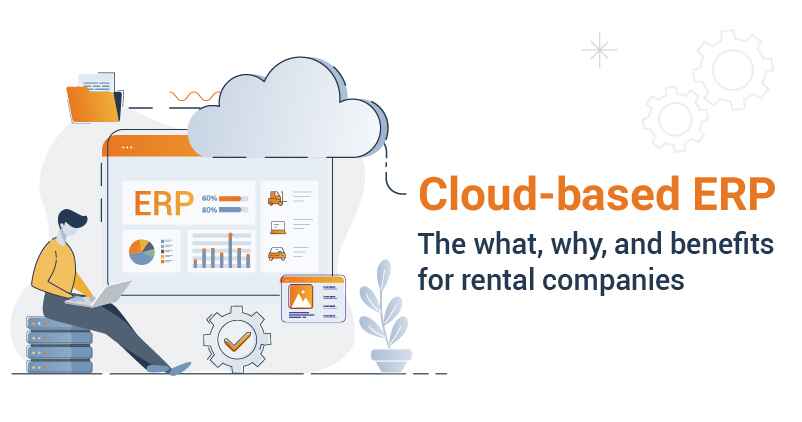It’s the era of digital transformation, and there are no two ways about it. With technological advancements driving the equipment rental landscape, rental companies must embrace the cloud to stay competitive.
But what is cloud software, and how does it impact the equipment rental industry?
Cloud technology can potentially transform your rental business end-to-end with automation and flexibility. We also deliver cloud-based software to rental companies called, DynaRent, a solution embedded in Microsoft Dynamics 365 for Finance and Supply Chain Management.
This blog will share what the cloud means for you as an equipment rental company looking to become digitally mature.
We will cover the following:
- What does cloud-based ERP software mean?
- Why are equipment rental companies moving to the cloud?
- Why should you transition to cloud-based rental ERP software?
- 6 quick benefits cloud ERP software offers rental companies
- How can you get started with cloud ERP?
What does cloud-based ERP software mean?
Cloud-based software refers to delivering services that are stored, managed, and available through the internet. These services include software programs, applications, databases, and servers.
Cloud ERP is Enterprise Resource Planning software available and accessible online. Revolutionizing information technology, cloud ERP is a shift from the traditional way businesses perceive IT resources.
Rather than storing data in a single physical location such as a hard drive or local storage device, cloud ERP software can store and maintain data in a remote database in an offsite and secure location. For instance, Microsoft offers ERP solutions on Azure with the highest security levels.
Users with an internet connection can access the services or software programs at any given time and location, allowing for greater flexibility and scalability.
Why are equipment rental companies moving to the cloud?
Every equipment rental business must be able to track their equipment across various locations, plan and schedule reservations, invoice customers, maintain equipment, analyze profitability, and reduce downtime.
Before we were enjoying the benefits of cloud technology, rental companies had to rely on bespoke, specialized systems or custom software which required an upgrade every few years. Separate software systems were purchased from multiple providers to support different functions in your business, increasing internal expenses around maintenance.
Fearing the hindrance these upgrades bring onto daily operations, most rental companies would postpone or avoid the upgrades, missing using new features.
Cloud technology has put all challenges related to software upgrades and re-implementations out the window.
By consolidating rental operations on a single technology with automated and digital processes, the cloud has proven to be a transformational solution for the rental market.
The speed of scalability coupled with the COVID-19 pandemic drives cloud adoption on an upward trajectory, anticipating a CAGR of 15.7% from 2022 to 2030 — and rental companies are happily adopting it.
Today, the need for remote work and scalability has become more crucial than ever, making cloud technology a realistic and economical option for rental companies.
By moving to the cloud, rental companies swiftly address the following challenges:
- Error-prone manual operations
- Scattered data and documentation
- Upgrade and maintenance issues
- User adoption and training challenges
- Extensive integration with siloed systems
- Limited ability to scale and grow
- Risks of operational downtime
Why should you transition to cloud-based rental ERP software?
To this date, many equipment rental businesses still run multiple siloed software and use manual spreadsheets for record-keeping and equipment tracking. The problem with this approach is that operations run reactively based on historical data instead of real-time feedback.
The above-discussed challenges persist, and gradually the business won’t have the resources to expand or meet customer demands.
If you want to avoid the risk of your rental business going obsolete with the competition too far ahead to catch up to, start thinking about cloud migration.
With a more centralized approach to storing, accessing, managing, and sharing data, cloud software makes the life of everyone in your business easier. Transitioning to the cloud is also easy and affordable, as you do not have to rewrite your system.
A cloud-based rental ERP software can manage your entire rental lifecycle, operations, administration, and finances in one system. Offering easy user adoption with uniform systems, it ensures your software always runs on the latest version.
6 quick benefits cloud ERP software offers rental companies
1. Lowered costs in infrastructure and workforce
Cloud solutions are cost-effective, easy-to-install and don't require coding support. It eliminates the capital expense of buying hardware, saving extensive upfront costs, including infrastructure, IT staff, system maintenance, and upgrades.
2. Data Security and Protection
With cloud ERP, you are guaranteed data security as your data is secured across multiple servers. You don’t have to worry about losing your data, as the data is regularly backed up, ensuring business continuity.
3. Flexibility to scale the system based on the need
Cloud-based ERP provides more flexibility for equipment rental companies than on-premises software. Users can swiftly scale up or down based on the changing business requirements. Information exchange and communication are smoother with data access just an internet connection away.
4. Access to real-time data anytime, anywhere
All users have instant access to updated data and applications as the cloud ERP software is hosted centrally. Information can be accessed from any location at any time, as cloud ERP is built for mobility and connects all your data in one platform.
5. Futureproofing technology with regular updates
Any new releases of cloud-based ERP software are often delivered automatically, without downtime. Rental businesses can have a future-proof solution running on the most up-to-date system possible and benefit from the new features at no additional cost.
6. Analytics and Business Intelligence
Cloud ERP offers exciting analytics and reporting to measure asset performance, utilization rates, and booking trends, among other critical metrics. With the ability to access, analyze, and visualize data in the cloud, you can better optimize your rental operations and boost profitability.
|
Related reading: Which Option Is Better? Cloud-Based Equipment Rental Software versus Local Rental Software |
How can you get started with cloud ERP?
When evaluating a solution for your business, do the following:
- Identify the specific needs of your rental business by creating a comprehensive list of software features and requirements.
- Collaborate with different teams in your business to identify problem areas and challenging processes which require automation.
- Research your solution options based on your business criteria and needs.
- Evaluate the different options and analyze them against a predefined set of parameters (such as budget, implementation, ERP, etc.).
Moving to the cloud can be intimidating, but it can become a smooth journey with the right solution and ISV by your side. Not all providers offer the same level of expertise, so it is essential to do extensive research and compare the list of requirements with a checklist.
We at To-Increase have been in the equipment rental industry for nearly 20 years. Having interacted with thousands of rental businesses around the globe, we know what works and can help you on the journey to embracing cloud ERP.
Begin your cloud journey by looking into this checklist on the Equipment Rental ERP Essentials, which shares information on:
- Selection criteria to consider
- Crucial rental ERP essentials
- Conditions to ensure the success of your software

.png)



